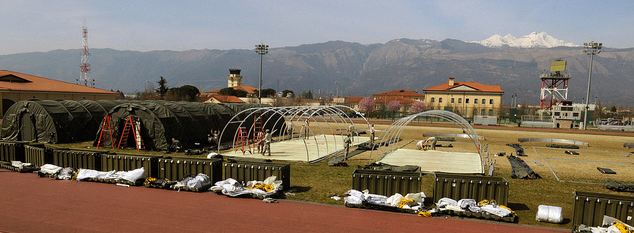
Tents are popping up on the sports field at Aviano air base in Italy to house U.S. troops launching air missions against Libya / Air Force photo by Nadine Barclay
Admiral Jim Stavridis, one of America’s top military commanders (he’s running U.S. European Command — and NATO — now, and is a front-runner to be chairman of the Joint Chiefs by year’s end) offered a telling comment about Libya Tuesday before the Senate Armed Services Committee.
“I think a stalemate,” he said, “is not in anybody’s interest.”
OK. Let’s follow that line of thinking. Muammar Gaddafi can’t win, because allied airpower will keep his forces bottled up where they are. If they move, they die. The rebels can’t win, because they’re militarily incompetent. Result: stalemate.
The way this is going — and, more vitally, where it ends — upsets a lot of experts. “I’ve always believed that an outside party has only three courses of action regarding a civil war,” says Anthony Zinni, a retired Marine general who ran U.S. Central Command from 1997 to 2000. “Stay out, separate the parties and promote a dialogue for resolution, or pick a side and give it all it needs to succeed.”
Washington and its allies, he fears, are headed down none of those paths. “I cannot figure out what course this Administration is on,” Zinni says. “The coalition is all over the map, the State Department wants war but the Defense Department is wary. There no strategy or clear political objectives, and the cost to us will begin to erode any public support if this continues.”
So what’s a nervous superpower — whose leader is facing re-election next year — supposed to do?
The default position in such campaigns is always the same: let’s do a little more in the hopes that it will tilt the outcome our way. That’s why there’s all this talk all of a sudden about arming the rebel forces, despite the old military maxim that hope is not a policy.
As my colleague Tony Karon points out over on Global Spin, there’s all sorts of problems associated with such a move. Never mind the diplomatic complications — nations eager for a feel-good no-fly zone might not feel so kindly toward involvement on the ground. The coalition could splinter over it.
But U.S. officers I have chatted with suggest that arms are merely a symptom of deeper problems affecting the Libyan operation. They won’t be quoted by name, so I’ll let one of their former colleagues echo their views.
If the rebel shooters cannot take Tripoli, they don’t deserve to have Tripoli. That failure means they do not represent a majority of the Libyans and are not the vanguard of a country-wide revolution. Their weaknesses are not in weapons, so much as in hubris in the face of trained soldiers; lack of basic tactical training; lack of leadership; lack of organization; no logistics and also a lack of any evident appreciation that these capabilities are essential. They may be killers, but they are not soldiers. Giving these undisciplined men weapons or even ammunition would be an irresponsible waste of resources that risks massacre of pro-Qadhafi civilians when pro-Qadhafi forces withdraw. Would the Coalition and NATO defend those civilians?
That’s the view of former veteran Defense Intelligence Agency analyst John McCreary, who now produces the NightWatch blog. His view is widely shared inside the Pentagon, and it highlights just why Defense Secretary Robert Gates and Adm. Mike Mullen, chairman of the Joint Chiefs of Staff, were so reluctant to take on this mission.
Gaddafi, of course, has been wielding mercenaries to fight the rebels. One option, instead of sending in U.S. ground troops to get rid of Gaddafi once and for all, might be to do what he is doing — hire mercenaries to do the dirty work. In fact, Deane-Peter Baker — an assistant professor in the U.S. Naval Academy’s Department of Leadership, Ethics and Law, suggests just that in a Baltimore Sun op-ed:
Whether or not the U.S. should have become involved in Libya’s civil war is a moot point. We are involved, and we now bear some of the responsibility for how this all unfolds. At the same time, we also have a responsibility not to unduly risk the lives of U.S. military personnel in a war that really has little to do with U.S. national interests. Contractors, the ultimate volunteers, offer us a way to honorably fulfill both responsibilities.
You can almost hear the President putting the newspaper down as his national-security team gathers in the Oval Office: “Anybody got a phone number for Blackwater, or whatever that outfit is calling itself now?” It’s Xe (pronounced zee), Mr. President. And you can reach them at 252-435-2488.


